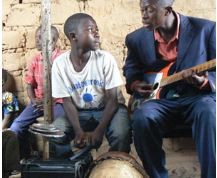Presbyterian World Mission’s office of Equipping for Mission Involvement is offering a series of free webinars to provide practical tools and resources for mission leaders. Each of the webinars lasts approximately one hour. The World Mission Today webinar series is designed to help in planning meaningful and mutually beneficial mission experiences at home and around the world.
“Mission is life-giving,” says Ellen Sherby, coordinator, Equipping for Mission Involvement, and former mission co-worker in Nicaragua. “But it can be overwhelming to know how to get started. These webinars will give mission leaders tools to plan and lead meaningful mission experiences.”
The most recent webinar, “Planning and Leading a Great Mission Trip,” features Sara Armstrong and Rusty Edmondson, mission co-workers and partnership facilitators in Peru; and Elizabeth Little, church support associate with extensive experience in planning and leading short-term mission trips. Little has led or served on 21 short-term mission trips to 10 different countries, including Cuba, Congo, Malawi, Brazil and Haiti. In addition, she worked with approximately 10 volunteer church groups each week during her years with Presbyterian Disaster Assistance in Mississippi.
Each year, churches and presbyteries send thousands of Presbyterians on short-term mission trips. Trip leaders say these experiences often change people’s lives, enabling them to see God at work in ways they had never expected.
According to mission leaders, planning and leading a short-term mission trip takes a prayerful mind, an open heart, and a willing spirit before the plane ever leaves the runway. It also requires careful planning, preparation and training before, during and after the trip.
Before the trip
- Hold at least four, 60- to 90-minute planning meetings for team building and orientation. Emphasize to the team that mission is not about “doing for.” It’s about “being with.”
- At the planning meetings, define your expectations. Share what you are most afraid of and most looking forward to. Study the culture and history of the partners you’ll be working alongside. Discuss “do no harm.” Discuss partners’ expectations of time, clothing choices and formal greetings.
- Commit to Christ-centered prayer and scripture reading; help each member of the team learn to tell his or her faith story and learn from the faith stories of others.
- Plan roles of participation (publicist, photographer, etc.) Write a group covenant and hold one another accountable.
During the trip
- Be flexible. As needs change, be ready to change plans.
- Learn through personal connections and time spent with partners and site hosts.
- Minimize time spent on social media.
- Schedule daily reflection and devotional time.
After the trip
- Remember a mission success story is not about building a feeding center or a school in a week. It’s more about the people and the long-term relationships being established and strengthened. Alleviating poverty cannot happen in a week or two.
- When the team comes home the mission doesn’t end. There are pictures to be shared and stories to be told. Be sure to allow adequate time for processing of all emotions and experiences of team members. Perhaps have a dinner for everyone in your church who has ever visited the mission site.
- Listen and take note of what worked and what could have worked better. Learn from one another to help in planning your next short-term mission experience. Discuss how to maintain and strengthen the partner relationships you have begun to build.
The link to the complete World Mission Today webinar schedule is online and includes registration information and an archive of past webinars. For more information contact the Rev. Christine Coy Fohr, consultant for mission leaders, 800-728-7228, x5391.
Registration for the next webinar, Leading Children and Youth in Mission, from 1-2pm on May 27 is open.

